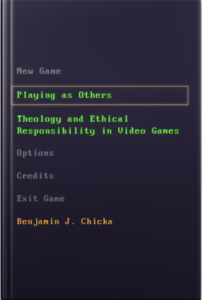
Playing as Others: Theology and Ethical Responsibility in Video Games
Since their inception, video games have often been viewed as trivial or unworthy of significant theological study. However, Benjamin Chicka argues that this posture is a mistake: video games represent powerful cultural artifacts that possess the potential for tremendous theological depth, and they provide us with new vistas of ethical possibilities. Whereas most serious theological literature on gaming has typically sought to tackle various gaming-related topics from a certain theological tradition, Chicka’s book is one of the first to provide readers with an actual theological gaming method that not only provides a tool to analyze video games’ depths and possibilities, but also a possible blueprint to use video games to promote meaningful ethical action in the world.
In some ways Chicka’s book stands in line with other serious academic works on gaming such as Nick Dyer-Witheford and Greig de Peuter’s Games of Empire in that Chicka recognizes video games as a significant socio-political force and he embraces their potential to not only increase empathy and awareness of various types of “others,” but to also spur ethical action on a wide variety of pressing modern social issues (5). However, whereas many gaming scholars such as Dyer-Witheford openly reject religious frameworks to interpret gaming culture, Chicka’s approach is openly religious, grounded firmly upon modified forms of Paul Tillich’s theology of culture and Emmanuel Levinas’ ethics of responsibility in which ethics and the call of the other precede ontology. Together, this foundation leads to an approach that inseparably intertwines culture and religion based on Tillich’s notion of God as the ground-of-being, a transcendent reality that infuses everything with the potential for divine meaning. In this way Chicka considers himself a philosophical theologian, focused on finding truth wherever it may exist in culture and rejecting any form of confessional approach that restricts God’s activity in the world or that denies that what is ultimate can be found anywhere in the world. Furthermore, in this book Chicka’s primary concern is ultimate reality and how to live ethically in light of that reality.
To this end, he argues that video games are like all forms of culture. They possess the potential for good and evil and even more importantly, they need to be taken far more seriously by theologians due to their increasingly significant and influential presence in culture and their use by a wide variety of cultural institutions such as politics, the military, and so on. What is more, video games and their interactive nature have introduced an entirely new dimension of digital media in which God may be powerfully encountered, that can critique and analyze structural issues, and most importantly from Chicka’s point of view, they can provide opportunities to encounter the other. Non-traditional games can draw attention to the plight and face of the marginalized, provide a space for others to express and explore their true selves, and increase representation of minorities. As an example, Chicka adduces Papers, Please, an award-winning game set in Arstozka, a fictional Cold-War era Eastern Bloc country, that explores the complexities and realities of immigration in a deeply thoughtful manner. On the other hand, he draws attention to unfortunate gaming-related tragedies such as Gamergate—an online culture war that erupted around the non-traditional game, Depression Quest, in 2014—that ought to draw our attention and serve as a pivotal moment in history that demonstrates the need for new paradigms that can adequately meet new challenges and questions.
Structurally, this book is divided into two sections: chapters 1–3 provide the outline of Chicka’s cultural method and chapters 4–7 apply this method to a variety of modern ethical concerns. In chapter 1, he introduces Tillich, who provides the primary theological support for Chicka’s method in general. At a more granular level, the author leverages Tillich’s notion of God as the ground-of-being to show that video games ought to be taken seriously as a cultural form that can contain ultimate truth and that video games offer a valuable means to develop a sense of love and ethical responsibility toward other people. He supports these claims by first arguing that God is the depth of all reality who can break through the autonomous activities of a given culture. That is, any material form such as a video game can be endowed with transcendent import that allows divine truth to be encountered due to God being connected to, though not synonymous with, all material forms. Video games, particularly non-traditional games that embrace an empathetic approach and inspire ethical responsibility towards others, can act as catalysts: drawing us and others toward God’s divine depths and the self-realization, courage, and sense of the other that those divine depths provide. An example of this is Cart Life, a simulation of the struggle many face to survive poverty: from immigrants struggling to make ends meet to poor mothers trying to regain custody of their children. In the game, players are faced with realistic hypothetical situations and heart-rending calamities that many real neighbors struggle with every day. By interacting and becoming aware of these very real realities, players are invited to grow in understanding, empathy, and ethical action towards our less fortunate neighbors.
Chapters 2 and 3 seek to modify Tillich’s basic framework by clarifying exactly what ethical responsibility in digital spaces fundamentally entails. To this end, Chicka introduces the Jewish ethicist Emmanuel Levinas, who believes that ultimately our being, our identity in the world, is not formed in a vacuum. Who we are only occurs when we encounter the face of the other whose presence demands a response, a response that in turn shapes who we are. However, Levinas stresses that genuine human flourishing can only occur when we accept the call of the other and act in a manner that includes compassion, empathy, and mutual respect, and that prioritizes the needs of the oppressed and marginalized, who are prevented from experiencing their true depths and freedom. Drawing from Levinas, Chicka writes that non-traditional video games like Depression Quest, an interactive game where you play someone living with depression, provide an important new way to show that God can be encountered through online play with others and that we must recognize that the face of the other is prior to a physical face, that the face of the other includes digital faces as well. One helpful way that Chicka illustrates this is by drawing attention to recent research conducted, while people were playing video games, on hormones such as oxytocin that increase feelings of empathy, generosity, and trust, and those such as testosterone and cortisol that tend to increase aggressive behavior or limit our body’s release of oxytocin. Based on these studies, Chicka shows that our bodies do not differentiate between physical and digital social encounters and that online behaviors such as checking our social media feeds or spending time playing with others can shape us in profound ways.
The last several chapters of the book provide concrete examples of video games and other gaming related institutions that have positively contributed to society: whether by exerting political pressure on important issues, showing games that provide freedom for people to explore their true selves, or by drawing specific attention to the plight of others in order to engender empathy and understanding. For example, Chicka describes Gone Home, an experimental exploration game that follows the story of a lesbian teenager who faces ostracism from her family and that emphasizes diversity and a plot that can help the player develop empathy and understanding without instrumentalizing “the other.” In another example, Chicka examines the situation of non-traditional game designers and the economic hardship that often accompanies those who seek to develop new game designs that resist impulses towards violence and shallow depictions of various people groups and issues.
This reviewer found Playing as Others to be a thoughtful and well-written book that provides the reader with a robust theological video game methodology that is coherent, rich, and practical. Further, this book also reads in a refreshingly genuine manner, often including anecdotes that emerge from Chicka’s past and his personal interaction with important gaming-related figures and institutions. While a non-confessional theological method will not be persuasive to everyone, Chicka argues his case well and shows a strong and wide-ranging grasp of both Tillich and Levinas. His approach is among the first of many that are likely to come. It will be interesting to see how other thinkers from distinctive Christian traditions address these issues.
This book represents an important contribution to theological studies and would be most useful to video games scholars, ethicists, and professionals who work or intend to work in gaming related fields.























